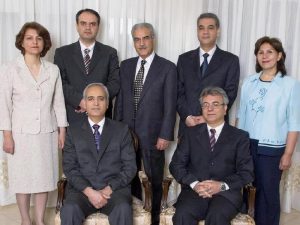
news.bahai.org / Montreal Gazette
Some 34 recommendations from Iran’s last UPR concerned violations of the rights of the Baha’i religious minority, and serve as a case study of Iran’s failure to implement UPR recommendations generally. For example:
Baha’i continue to be arrested for their beliefs at an alarming pace. Since the last UPR, more than 450 have been arrested, despite Iran’s acceptance of recommendations ranging from the protection of religious freedom to the safeguarding of the rights of detainees, protection against torture, and fair trials for the Baha’i.
The constant threat of raids, arrests, detention, and imprisonment are among the main features of Iran’s persecution of the Baha’i over the last decade. This persecution has intensified since the last UPR, despite Iranian promises, and more recently, promises by President Hassan Rouhani to “end discrimination on the basis of religion.”
Violent attacks on the Baha’i continue to go unpunished, despite Iran’s acceptance of recommendations that call for ending “the current culture of impunity.” For example, in August 2013, a Baha’i in Bandar Abbas was murdered by unknown assailants, shot in the head in a religiously motivated crime; in January 2014, an attacker stabbed a family of three in Birjand. No one has been brought to justice for either crime. Moreover, attacks on Baha’i cemeteries have also continued with impunity.
State-sanctioned incitement to hatred of the Baha’i in official Iranian media has dramatically increased — and continues to go unprosecuted — despite a recommendation accepted by Iran that calls on the government to “[f]ully respect the rights of the adherents of the Baha’i faith and to judicially prosecute those inciting hatred against them in religious environments.” Indeed, in the first half of 2014, the volume of such media attacks rose sharply from 55 incidents in January to at least 565 in June.
Baha’i youth remain deprived of access to higher education as a matter of government policy, in clear violation of Iran’s acceptance of recommendations that call for an end to discrimination on the basis of religion, and for improved access to higher education.
Seven Baha’i leaders, known as the “Yaran-i-Iran,” remain imprisoned following a trial devoid of any semblance of due process, despite Iranian undertakings to conduct trials that are “fair” and “transparent.” Indeed, their arbitrary arrests, illegal detentions, torture and ill-treatment in detention, and absence of due process, are themselves a dramatic case study of the violations by Iran of its international obligations.
Following their arbitrary arrests, during which time the Baha’i Seven were effectively disappeared persons and their whereabouts unknown, no charges were filed against them for nine months. They were denied access to their lawyers for more than a year, then allowed access for one hour only before their trial began, and systematically denied bail, despite numerous requests.
When their trial finally began in 2010 — a few weeks before Iran’s first UPR — the Seven were convicted on false and trumped-up charges, including espionage, “propaganda activities against the regime” and organizing an “illegal administration.” At a closed hearing from which the media and the public were excluded, each was sentenced to 20 years’ imprisonment, the longest sentences imposed on any prisoners of conscience currently in Iran. One month later, the appeal court revoked three of the charges and reduced the sentences to 10 years. Six months after that, prison authorities informed them that the original sentences had been reinstated. Despite repeated entreaties, the Seven have never received official copies of their verdicts, of the appeal court’s ruling to temporarily reduce their sentences, or of the decision to reverse the ruling of the court of appeal.
Simply put, the “crime” of the Seven was the practice of their faith, a right guaranteed them under the International Covenant for Civil and Political Rights, to which Iran is a party. They have suffered arbitrary, illegal and prolonged detention, as well as torture and ill treatment, and they have been denied the right to a fair and transparent trial within a reasonable time.
In effect, the trial of the Seven — Mahvash Sabet, Fariba Kamalabadi, Jamaloddin Khanjani, Afif Naeimi, Saeid Rezaie, Behrouz Tavakkoli and Vahid Tizfahm — was a trial of the Baha’i community as a whole. It was also a trial of the more than 900 other prisoners of conscience, including other ethnic and religious leaders, human-rights defenders, journalists, bloggers and students, whose unjust imprisonment continues despite President Rouhani’s promise to ensure “equality for all citizens without discrimination based on race, gender, or religion.”
This year marks the sixth anniversary of the Baha’i Seven’s imprisonment. The two imprisoned women remain in Tehran’s notorious Evin Prison, and the five men in the equally notorious Gohardasht Prison in Karaj. As the UN Human Rights Council conducts its 2014 UPR, it should hold the Iranian regime to account for its widespread and systematic violations of Iran’s own undertakings to the Seven — to uphold the foundational principle of freedom of religion — and of its commitments to the international community, in the form of its acceptance of 123 UPR recommendations.
On that record, Iran itself should stand trial.
Irwin Cotler is emeritus professor of law at McGill University and former minister of justice and attorney general of Canada. He is a co-sponsor of Iran Accountability Week and co-Chairs (with U.S. Senator Mark Kirk) the Global Iranian Political Prisoner Advocacy Project. Renée Maria Tremblay was a recent visiting professional at the International Criminal Court in The Hague.
October 31, 2014 9:37 am
I think that a warrant by the International Criminal Court is more than warranted in this case.
November 1, 2014 5:21 pm
I second that motion that Iran should stand trial for persecution of Baha’is and all other innocent Iranians.